When talking about all-time greats in hockey, there are a few names that come to mind. Wayne Gretzky. Bobby Orr. Mario Lemieux. Among those greats, one defenseman had arguably the best career an NHL defender has ever had. He collected records, trophies, and ultimately ended up as one player the entire hockey world was cheering for.
Sign up for our NHL History Substack newsletter
Raymond Jean Bourque had a lengthy NHL career, nearly entirely with the Boston Bruins. He was a fan favourite, and quickly became one of the best to ever play the game. Despite all of his accolades and his 21 seasons with the Bruins, his short time with the Colorado Avalanche stands out as a moment that captured the hearts of all hockey fans.
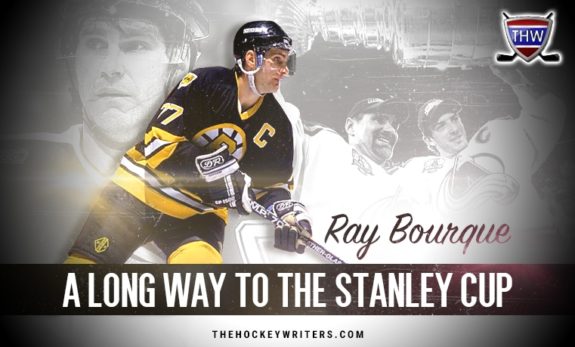
Bourque’s is a story that brings chills when you hear it. He’s one of the best stories the NHL has ever had, and, as mentioned, his brilliant career left him as one of the all-time greats. Here’s a look back at one of the most storied careers the hockey world has ever seen.
NHL Awards
Over the course of his 22-season career between the Bruins and the Avalanche, Bourque cemented himself as a hockey legend. He rose up the all-time leaderboards, collecting hardware along the way:
- First in career points by a defenseman (1,579)
- 11th all-time in points
- First in Bruins’ all-time points (1,506)
- First in career goals by a defenseman (410)
- First in career assist by a defenseman (1,169)
- Fourth all-time in assists
- First in Bruins’ all-time assists (1,111)
- First in career shots (6,209)
- Fourth all-time in games played by a defenseman (1,612)
- 11th all-time in games played
- First in Bruins all-time games played (1,518)
- Calder Memorial Trophy (1980)
- Five-time James Norris Memorial Trophy (fourth-most) (1987, 1988, 1990, 1991, and 1994)
- King Clancy Memorial Trophy (1992)
- Lester Patrick Trophy (2003)
- 13-time First-Team All-Star (most in history) (1980, 1982, 1984, 1985, 1987, 1988, 1990, 1991, 1992, 1993, 1994, 1996, and 2001)
- Six-time Second-Team All-Star (1981, 1983, 1986, 1989, 1995 and 1999)
- Played in the All-Star Game every year of his career it was held (it wasn’t held in 1987 or 1995)
- Stanley Cup Champion (2001)
- Hockey Hall of Fame first-ballot inductee (2004)
- Keith Magnuson “Man of the Year” (2019)
It’s an extremely lengthy list, a testament to the career he had. He was inducted into the Hockey Hall of Fame, in his first year of eligibility, in 2004. He is one of few to have that honour in the first year possible. He’s also one of only nine players to have his jersey number, 77, retired by two teams. In 2017, he was named one of the NHL’s 100 Greatest Players of all-time.
Ray Bourque – QMJHL Days
Before he was an NHL legend, Bourque had to work his way up the ranks. In 1976, the Saint-Laurent, Quebec native was drafted 22nd-overall to the QMJHL’s Trois-Rivères Draveurs. He wouldn’t stick there for long though, as halfway through his rookie season he was traded to the Sorel Éperviers after accumulating three goals, 20 assists, and 23 points in 39 games. He finished the season with the Éperviers, collecting another nine goals, 16 assists, and 25 points in 30 games.
The following season, the Éperviers moved to Verdun, where Bourque began to come into his own. In 1977-78, he played 72 games, collecting 22 goals, 57 assists, and 79 points. He followed that up with an even more impressive 1978-79 campaign, where he scored another 22 goals but added 71 assists for 93 points in 63 games.
In both of those seasons, he was named to the QMJHL First All-Start Team. In the second, and what would turn out to be his final QMJHL season, he also won the Emile Bouchard Trophy as Defenseman of the Year, and the Frank J. Selke Trophy as the Most Sportsmanlike Player. Needless to say, he caught the attention of the NHL.
Draft Day 1979
On Aug. 9, 1979, the NHL Entry Draft took place in Montreal, Quebec. This was the first draft after the NHL-WHA merger and the first draft where the minimum age was lowered from 20 to 18. Because of this change, there were basically three years of draft-eligible prospects to pick from, and the 1979 NHL Draft would go down as one of the best all-time.
Related: The 3 Defensemen Drafted Before Ray Bourque
Bourque ended up going eighth-overall behind Rob Ramage, Perry Turnbull, Mike Foligno, Mike Gartner, Rick Vaive, Craig Hartsburg, and Keith Brown. It’s safe to say that a few teams would go on to regret their selections. As would the Los Angeles Kings – because it should have been their draft pick. The Kings had actually traded their first-round pick to the Bruins in exchange for goaltender Ron Grahame, who only played three seasons with the Kings. Looking back, this trade may be one of the best in Bruins’ history.
Another interesting part of this eighth-overall selection is that Bourque was then-general manager Harry Sinden’s second choice with the pick. He came to the draft planning to select Keith Brown, who went seventh to the Chicago Blackhawks. Not a bad consolation prize. Brown did go on to play 14 seasons with the Blackhawks but was nowhere near Bourque’s level.
Bourque and the Bruins
Bourque Makes Early Impact
After being drafted, Bourque wasted no time at all. He made the jump straight into the NHL and came out of the gate blazing. In his debut game on Oct. 11, 1979, Bourque and the B’s faced the original Winnipeg Jets. On the power play, the rookie collected a pass from Boston great, Rick Middleton, taking a shot that deflected past Lindsay Middlebrook. It the first goal and point of many for the young defender.
As it turned out, that first point of many could not only describe Bourque’s career but his rookie season as well. In 80 games, the new star scored 17 goals, 48 assists, and 65 points. For his efforts, he was named to the First All-Star team and awarded the Calder Memorial Trophy as the rookie of the year. He also finished fourth in James Norris Trophy voting as the best defender in the league. It wouldn’t be long before he became very familiar with that award.
Bourque’s debut season was a sign of things to come for him and the Bruins. His first season finished with 0.81 points per game. His sophomore season saw that rise marginally to 0.84 points per game, finishing with 27 goals, 29 assists, and 56 points in 67 games. He was named to the Second All-Star team this season. In 1981-82, his third campaign, Bourque’s production shot up, playing over a point-a-game at 1.02 with 17 goals, 49 assists, and 66 points in 65 games. He maintained over a point-per-game pace for the next twelve-straight seasons, including his career-best 1983-84 season that saw him score 31 goals, 65 assists, and 96 points.
Co-Captain Bourque
In 1985, two-season captain Terry O’Reilly retired after spending his entire 14-year career in Boston. Rather than picking one captain to replace him, the Bruins opted to select two players to wear the “C” – Bourque and his first-goal helper, Middleton. Middleton had the “C” during home games, while Bourque was the away captain.
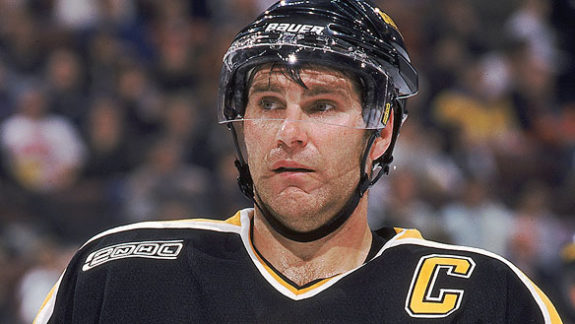
They did that until 1988 when Middleton decided to hang his skates up. Bourque was named the sole captain then, a title he held for the remainder of his Bruins’ tenure. His time as the leader of the Bruins saw him pass Dit Clapper as the longest-served captain in Bruins’ history and NHL history. While he still holds that distinction for the Bruins, Detroit Red Wings’ Steve Yzerman passed him as the NHL’s longest served captain in history.
1986 to 1994: Award-Winning Seasons
With a Calder trophy under his belt from 1980, it was a few years before Bourque got his name on some hardware again. But it wasn’t for a lack of trying. Bourque has an extremely interesting and impressive fact tied to him, in that he was in the top-seven for the Norris Trophy in every single season that he was in the league. That’s 21 years of being voted as one of the best defenders in the league.
Bourque was the gold standard of defensemen throughout his career, and him at his peak was something to behold. This was a time where defenders like Paul Coffey, Chris Chelios, and Brian Leetch were in the NHL and also at their best. Yet, he still came away with five Norris Trophies in this time.
In 1986-87, he finally came out on top of the voting, after being in the top four in the seven seasons – his first seven seasons in the league – before that. His first Norris trophy came at the end of a season where he collected a league-leading 334 shots on net. The many shots paid off, as he collected 23 goals, 72 points, and 95 points in 78 games – all of those stats lead defensemen in the league.
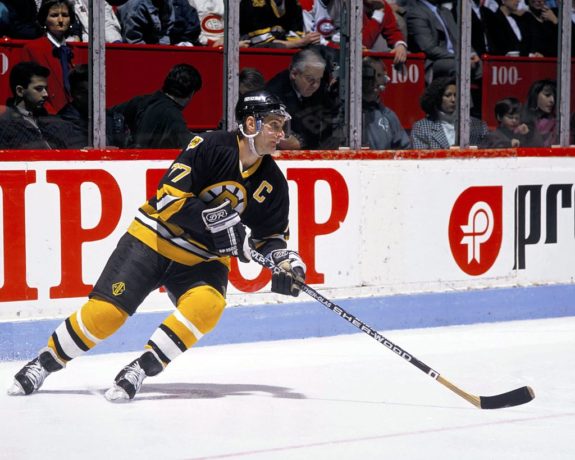
He wasted no time on his second Norris Trophy, winning it in back-to-back seasons after scoring 17 goals, 64 assists and 81 points. He kept his shots high though, ripping 344 shots on opposing goaltenders. He wouldn’t make it a three-peat, however, as a young Chelios would win his first Norris Trophy with the Montreal Canadiens.
He seemed to miss the title of the best defenseman in the league though, as he came back to win two more back-to-back Norris Trophies in 1989-90 and 1990-91 – his third and fourth. He was only the fifth player in NHL history to win three Norris Trophies and third to win three, after Doug Harvey and Bobby Orr. In 1989-90, he had 19 goals, 65 assists, and 84 points, followed up by 21 goals, 73 assists, and 94 points in 1990-91. He played 76 games in both seasons.
Again, he didn’t get his third Norris in a row though, as a young Leech ripped off a 22-goal, 80-assist season for a total of 102 points and the title (Bourque finished second). Bourque wouldn’t go without hardware in the season though, as he won the King Clancy Memorial Trophy, awarded to the player who best exemplifies leadership qualities on and off the ice and who has made a significant humanitarian contribution to their community. On top of his team leadership qualities, Bourque was involved in numerous charities and was most known as the honourable Chairman for Boston’s Floating Hospital for Infants and Children.
After finishing second in Norris voting again in 1991-92 (Chelios won his second), Bourque was awarded his fifth and final Norris Trophy. He had his fourth and final 90-point season, gathering 20 goals, 71 assists and 90 points. He also had 386 shots – his second-highest total (he had 390 in 1995-96). Again, Bourque was just the third player to hit five Norris trophies, with only Nicklas Lidstrom hitting four or more Norris Trophies (he ended up with seven). The individual awards may have been over, but the legacy was still very much being shaped.
The “Almost” Awards
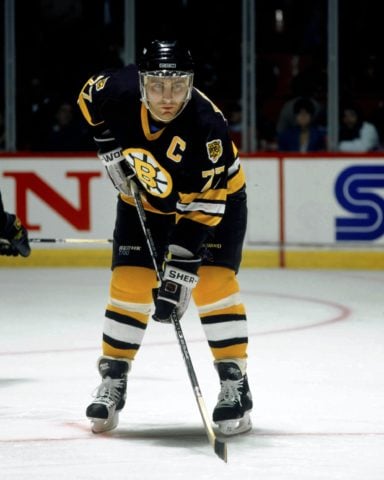
He has a long list of accolades, but Bourque was very close to being presented hardware many times. On top of his top-seven finishes for the Norris Trophy for 21 years (five wins, six second place, four third place, four fourth place, five seventh place), he was in the running for many other awards as well.
12 times, Bourque was in the top-15 of Hart Memorial Trophy voting as the regular-season MVP. That includes five times being in the top-five and twice as the runner up. In both those seasons that he was second place, he won the Norris Trophy (1989-90 and 1993-94) but he lost out on the MVP title to a 45-goal, 129-point Mark Messier and a 56-goal, 120-point Sergei Federov.
He was also often in the conversation for the Lady Byng Memorial Trophy, awarded to the player who exhibits sportsmanship and gentlemanly conduct while maintaining a high standard of playing ability. Bourque received votes in 11 seasons, including his last seven-straight campaigns. He finished between 25th and eighth in the final tallies.
Changing Numbers – 7 to 77
As shown through the King Clancy Award and his numerous Lady Byng votes, Bourque was a great leader and a gentlemanly player. These traits were on full display on Dec. 3, 1987. Up until this point, the Bruins defender was wearing number seven. However, the club decided to retire the number another B’s great in Phil Esposito – the number seven.
On the night of the ceremony, Bourque was still wearing his number as the team got ready to honour Esposito. but he had a surprise for everyone:
As seen in the video, Bourque took off his jersey in respect to Esposito, showing his new number: 77. That number would stay with him for the rest of his career.
Chasing the Cup
While Bourque was no doubt a star for the Bruins in his tenure, there was one thing missing from his time in Boston – the Stanley Cup. But, it wasn’t for a lack of trying. In fact, they came very close to having their names engraved on the Holy Grail of hockey.
In his 20 full seasons with the team, they made the playoffs 19 times, only missing in the 1996-97 season. This playoff miss saw the Bruins’ 29-year playoff run come to an end. Through all of these runs, Bourque proved that he wasn’t just a regular-season player. He led defensemen in playoff goals, assists, and points in three times (1983, 1990, 1991) and just assists and points in 1988. He was a weapon in the playoffs.
Unfortunately for Bourque, the Bruins never made it over the hump. They came close twice though, in 1988 and 1990 reaching the Stanley Cup Final and just so happened to face the same team in those two years – the Edmonton Oilers. The Oilers of that time were led by Wayne Gretzky in 1988 and Mark Messier in 1990. The team was extremely good and showed that, beating the Big Bad Bruins in four-straight games in 1988, and five games in 1990.
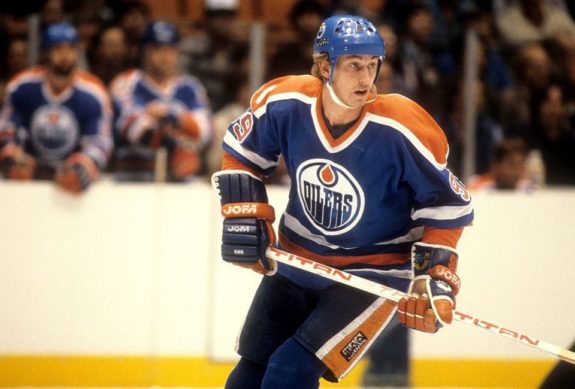
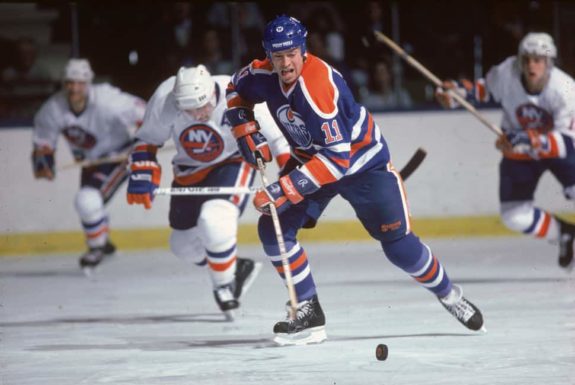
Bourque did everything he could in those two runs, collecting 21 points in 23 games for the first Final run, and 17 points in as many games for the second. Other than those to trips, the team only reached the Conference Final three times out of those 19 playoff runs, in 1983 (lost 4-2 to the New York Islanders, Bourque collected 23 points in 17 games), 1991 (lost 4-1 to the Pittsburgh Penguins, Bourque had 25 points in 19 games), and 1992 (lost to the Penguins 4-0, Bourque had nine points in 12 games).
In the other 14 playoff runs, the Bruins fell in the first two rounds. They could never seem to breakthrough, and near the end of the 1990s, Bourque and the team still had no Cup, but Bourque’s career was winding down.
Bourque’s Loyalty to the Bruins
Despite the team not winning the championship, Bourque remained loyal to the team that drafted him for many years. This was a double-edged sword though. While it made the organization and the fans love him even more, the NHLPA was less impressed.
Bourque was well-known for not wanting to draw out contract negotiations, preferring to quickly and quietly take a deal. There’s no doubt that he could have left at any point and become the highest-paid defenseman of all-time. Meanwhile, the NHLPA was trying to get players paid more by the league. Having one of the star players at the time continuously take less money did not help that cause.
March 6, 2000 – Bourque Traded to the Avalanche
In the 1999-00 season, the Bruins were on pace to miss the playoffs for the second time in four years. They had a great team together, but injuries left them at the bottom of the division. The 39-year-old Bourque, who just had one thing missing from his resume, requested a trade from the only team he had ever known. On March 6, 2000, the Bruins honoured his request and Bourque was off to the Colorado Avalanche.
To BOS: Brian Rolston, Martin Grenier, Samuel Påhlsson and a 2000 first-round draft pick (27th overall, Martin Samuelsson)
To COL: Bourque and Dave Andreychuk
After the transaction, Bourque addressed why he asked for the trade after all the years he spent in Boston.
“Why now? Well, two reasons. One: I asked to be traded because I want to win a Cup. It’s the one thing I haven’t accomplished in my career. And two: At this point in time, I needed a change. I want to find out what’s left to Ray Bourque.
Ray Bourque
Bourque and the Avalanche
Bourque joined a team that was absolutely stacked. Joe Sakic, Peter Forsberg, Adam Foote, Patrick Roy – the list goes on. Yet coming into Denver, Bourque made an immediate impact. He helped the team capture the division title and reach the Conference Final to face off against the Dallas Stars.
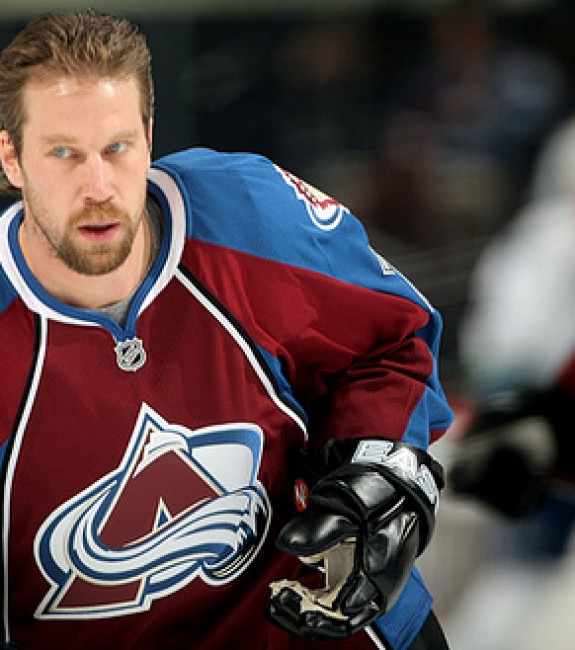
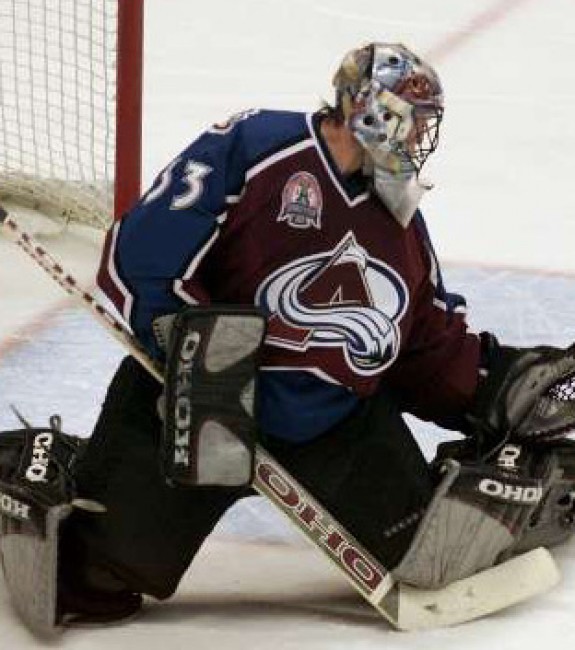
The series was one to behold, a back-and-forth series that went to Game 7. After falling behind 3-0 in the game, the Avalanche came back to bring the game to 3-2. In the dying minutes of the third period, Bourque ripped the puck on the net – hitting the post. The Avalanche lost the game and the series. Bourque had nine points in 13 games and averaged 29:38 per game.
Bourque decided to give it one more shot, returning to the Avs for the 2000-01 season. At 40-years old, Bourque was named an alternate captain and finished second in Norris Trophy voting, collecting seven goals, 52 assists, and 59 points in 80 games. Even at his age, he maintained 26:06 average ice time. His point total led the Avalanche defenders, which now included a newly-acquired Rob Blake who was acquired from the Los Angeles Kings.
He never took a day off, I remember once hiding his skates in my desk so he wouldn’t go out for an optional practice. Oh, he was mad. ‘Where are my skates?’ he was asking the trainer, me, anybody who’d listen. But I’ve got a 40-year-old defenseman who plays 30 minutes a night, and I want him rested.
Bob Hartley
On March 24, 2001, he played in Boston for the first time since the trade. The crowd cheered for him in the warm-ups, and he took his helmet off to wave to the crowd. He was the first player out of the tunnel to start the game, saluting the fans again with his stick. They won the game 4-2 and Bourque collected two assists.
I’ll always be a Bruin. I have a lot of memories here that can’t be taken away.
Ray Bourque
The team won the division, the conference, and the Presidents’ Trophy as the top team in the regular season. But that wasn’t the trophy they were playing for – and they weren’t done yet.
2000-01 Stanley Cup Playoffs
And thus began the final playoff run of Bourque’s career. They started out strong, facing the Vancouver Canucks and sweeping them in four-straight games. They had a harder time in the second round against Blake’s former team, the Kings. Despite going up three games to one, the Kings won the next two games, including a Game 6 double-overtime win to force Game 7. The Avs came out on top, reaching the Conference Final and the St. Louis Blues. Colorado won 4-1, including three straight games of overtime to end the series. Bourque and the Avalanche were headed to the Stanley Cup Final.
Playing against the New Jersey Devils, the Avalanche came out on top of the first game by a wide margin, 5-0. The Devils wouldn’t go easy though, winning the next game 2-1, before the Avs took Game 3 3-1 (Bourque scored the game-winning goal). The Devils were a very good team in the early 2000s though, you could never count out their trap-style play and goaltender Martin Brodeur. The Devils flipped the series upside down, taking the next two games (3-2 and 4-1), taking a 3-2 series lead and pushing the Avalanche to the point of elimination.
Two days before Game 6, Avalanche head coach Bob Hartley walked into the dressing room before an optional skate.
“I said to the guys, ‘What do you think? Does anyone have anything to say?'” Hartley said. “I probably walked three or four times around the locker room. Everybody had their heads down. Not a word. We knew we had opened the door for the Devils to win the Stanley Cup at home. It was hard enough to beat those guys in Denver, let alone New Jersey. Obviously the pressure was on us. No one would talk.”
But then, Bourque spoke.
Tears were actually rolling down his cheeks and he said: ‘It’s in your hands. I know there has been a lot of talk about my future. Well, after this, I’m done. I have one or two games left. You will decide how many more games I have left to play.’ Then he sat down.
Bob Hartley
Hartley continued, “You could’ve heard a pin drop. Funeral-home silence. That was the shortest meeting I’ve ever been a part of. Nobody wanted to be part of cancelling the party for Ray.”
The Avalanche came out dominant in Game 6, winning 4-0 to force a Game 7 and the final game of Bourque’s career. Alex Tanguay led the way with two goals and an assist, Sakic had a goal and an assist, and Bourque played 29:35. Roy stood on his head in net, stopping 25 of 26 shots and the Avalanche won the game 3-1.
The Avalanche, and Bourque, were Stanley Cup Champions.
Bourque & the Cup – Together at Last
Bourque’s story with the Cup doesn’t stop at winning it though. Upon the presentation of Stanley Cup from NHL Commissioner Gary Bettman to team captain Sakic, Sakic gave up his traditional first victory lap with the Cup and called the veteran Bourque over. He handed the trophy to Bourque, who held it high, kissed it, and broke down in tears.
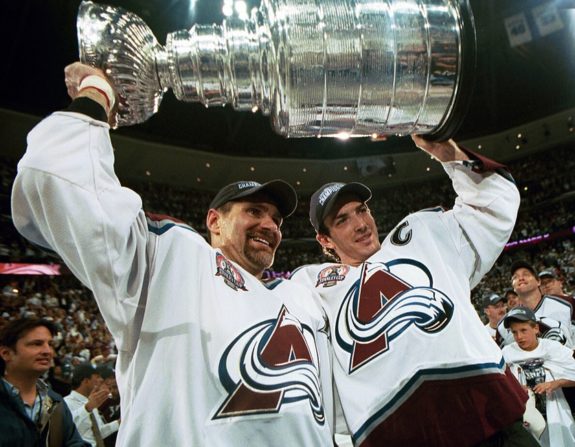
“I remember there being 10-11 seconds left on the clock,” Hartley said. “Faceoff in our zone. Ray had played a lot and he was just exhausted. I went to [assistant coach] Jacques [Cloutier] and said: ‘We’ve gotta throw Ray on the ice. There’s no way he’s winning the Cup sitting on the bench.’
“I didn’t even watch the puck those last 11 seconds. My eyes were on Ray. Even though I was a coach in that game, for that last faceoff I was a hockey fan, like everybody else. Watching one of the greatest stories, one of the greatest players, in NHL history.”
Related: Top 5 Moments in Stanley Cup Winning History
“The way it unfolded was really special,” said Blake, speaking about the final playoff run. “With a minute left, you know you’ve won. No one had talked about it, not out loud, but that part where Joe handed the Cup to Ray Bourque to be the first one to lift it … It showed the regard everyone had for Ray and also the class of Joe.
“You can’t go out any better than that.”
Bourque’s Retirement
On June 26, 2001, Bourque made it official, retiring from the NHL.
“It took a long time, but the timing was perfect,” Bourque said. “For me, this is a pretty neat finish. It means I retire as a champion.”
“Many of you have asked why I am retiring at a time when I am still playing pretty well. By far the most important factor is my desire to be around my children,” said the father of three. “Frankly, I also have had a strong commitment to myself never to stay too long in the game. Also, we are still on cloud nine having won the Stanley Cup and having achieved that goal kind of rounds out my career.
“It’s been a wonderful, happy, terrific 22 years.”
Shortly after his retirement, both the Bruins and the Avalanche announced that they would both be retiring Bourque’s number 77. His was the first-ever retired by the Avs (the Quebec Nordiques had retired five numbers). He is also one of only nine NHL players to have his number retired by two teams – it’s a prestigious honour.
Related: The Best NHL Defensemen Ever
In 2003, Bourque was awarded the Lester Patrick Trophy, awarded to those who have made a significant impact on hockey in the United States. Then, in 2004, Bourque was inducted into the Hockey Hall of Fame, becoming part of an elite list to be inducted in his first year of eligibility.
His recognition wasn’t done yet though. In 2019, Bourque was still being recognized for his contributions to the game, being awarded the Keith Magnuson “Man of the Year” Award by the NHL Alumni Association, awarded to an ambassador for the game at all levels through his continued commitment to the community and charitable causes.
The Ultimate All-Star
One aspect of Bourque’s career that we haven’t touched on yet is his track record with the All-Star team and the All-Star Game. There’s no question that Bourque was the ultimate All-Star. It started in his rookie season when on top of winning the Calder Trophy, he was named to the First All-Star Team. He was the first non-goaltender to win Rookie of the Year and be named to the First All-Star Team.
But as mentioned, that was just the beginning. Bourque was named to the First All-Star Team an incredible 13 times, the most of any player in NHL history. He was also named to the Second All-Star Team six times, meaning that in just two years of his 21-year career, he wasn’t on an All-Star Team.
Then, we have the All-Star Game. Bourque played in the All-Star Game 19 times. Again, you might think that he didn’t play in it for two seasons. But, there was no All-Star Game in 1987 or 1995. That means that he played in every single All-Star Game he could – 19 consecutive. He even won All-Star Game MVP in 1996.
But Bourque’s story with the All-Star Game doesn’t end there. By now, you should know that he was a defenseman. Well, this defender won the NHL’s accuracy competition eight times (1990, 1992, 1993, 1997, 1998, 1999, 2000, and 2001). As you can see in the video below, he was extremely good. In fact, he’s one of only five players to go four-for-four in the competition (it’s now timed rather than being based on attempts). He’s the only one to do it multiple times (1992 and 1993).
Bourque’s International Play
Finally, there’s one last aspect of Bourque’s hockey career to touch on: his International play. Bourque suited up for Canada four times. Most of this was playing in the Canada Cup (three times in 1981, 1984, and 1987). In these tournaments, he collected two gold medals and a silver, while collecting three goals, 14 assists, and 17 points in 24 games. His best came in 1987 when he had two goals, six assists, and eight points in nine games en route to his second gold. He was named to the Canada Cup All-Star Team this year as well.
Also in 1987, Bourque suited up for the NHL All-Stars in the Rendez-vous 87, a game between the NHL’s best and the Soviet Union. The teams split the two games, with Bourque picking up one goal in the event.
In 1998, Bourque was a member of Team Canada again, this time participating in the 1998 Winter Olympics in Nagano, Japan. The men didn’t get their desired outcome, finishing fourth in the tournament, but surprising to no one Bourque was his usual self, collecting a goal and two assists for three points in the six games played.
Remembering the Legend
“Al, Pronger, [Coffey], Potvin, those other guys … all great players,” said Brian Sutter, who coached Bourque for three seasons with the Bruins. “And I mean great players. But Raymond was a notch above them, above everybody. In my opinion, [he was] the greatest defenseman since the greatest-ever defenseman, Bobby Orr.
“He just did … everything. And [did it] as good [as] or better than anyone else. Was solid defensively, ran the power play, a guy that was always way better in his off side of the rink, played 30-35 minutes a night, every night.
“Every year, people used to ask me who I liked for the Norris Trophy (awarded to the League’s top defenseman). And every year I’d give ’em the same answer: Ray Bourque. Force of habit, I guess. But the guy was only the best defenseman on the planet for 20 years.”
